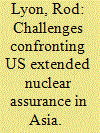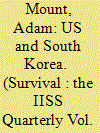| Srl | Item |
| 1 |
ID:
123986


|
|
|
|
|
| Publication |
2013.
|
| Summary/Abstract |
This article aims to explore the credibility of future US extended nuclear assurance in Asia.
Extended nuclear assurance, all too frequently confused with extended nuclear deterrence, faces a daunting series of challenges: a US strategic mainstream fractured on the roles and purposes of nuclear weapons; an Asia where assurance demands are high during a period of strategic uncertainty; and a US theatre- and tactical-range nuclear arsenal much depleted from its heyday. Meanwhile, nuclear latency is growing in Asia as more countries reach the technological level that the US attained in 1945, as nuclear skill sets become more prevalent, and as delivery vehicles appropriate to nuclear weapons become more typical in regional arsenals.
The US now provides extended nuclear assurance to nearly 40 countries worldwide, agreeing to run nuclear risks on behalf of its allies and friends. The bulk of those assurances derive from the NATO alliance, but it is the non-NATO-related assurances - and settings - that seem likely to be the more controversial ones over the next decade or two. Asia is coming into its own at a time when extended nuclear assurance needs reinvigoration as a key ingredient in US strategic policy.
|
|
|
|
|
|
|
|
|
|
|
|
|
|
|
|
| 2 |
ID:
192145


|
|
|
|
|
| Summary/Abstract |
As US officials have grown more anxious about the credibility of extended nuclear deterrence, they have placed renewed emphasis on nuclear-assurance measures. The hope is that closer exercises and consultations can reassure allies, strengthen deterrence postures and reduce the risk that an ally could pursue their own nuclear weapons. However, recent developments in the US–South Korea alliance suggest that nuclear assurance is not only ineffective at reassuring Seoul but may also be fuelling proliferation risks. By raising the salience of nuclear weapons within the alliance, nuclear assurance reinforces the fiction that South Korea’s defence depends on nuclear use. Misunderstanding the risks and potential of nuclear assurance has fuelled calls for a South Korean nuclear-weapons programme and obstructed the alliance’s ability to adapt and improve its deterrence posture.
|
|
|
|
|
|
|
|
|
|
|
|
|
|
|
|